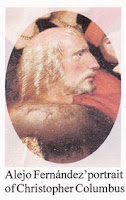FOR IMMEDIATE RELEASE
Contact: Gloria de Sá, Faculty Director
Ferreira-Mendes Portuguese American Archives
Phone: 508-910-6888
Email: mdesa@umassd.edu
THE SECRET IDENTITY OF COLUMBUS: PEASANT TO VICEROY IN 33
DAYS
October 12, 2012 – North Dartmouth, MA. The University of Massachusetts Dartmouth
Ferreira-Mendes Portuguese-American Archives announces a presentation by
historian Manuel Rosa titled “The Secret Identity of Columbus: Peasant to
Viceroy in 33 days.” The event—free and open to the public—will take place on
Thursday, October 25 at 5:30 P.M. in the Prince Henry Society Reading Room at
the Ferreira-Mendes Portuguese-American Archives. Light refreshments will be
served.
 “Will Christopher Columbus's picture soon adorn the walls of
many Lithuanian-American, Polish-American, and Portuguese-American institutions
as well as private homes of people of this background?” questioned the
organizers of a similar talk held last month at the Balzekas Museum of
Lithuanian Culture in Chicago. Mr.
Rosa’s research suggests that it should.
During his presentation, he will show historical evidence indicating
that the man credited with discovering America was not the son of a humble
weaver from Genoa, but rather a nobleman of Portuguese birth fathered by the
exiled Polish King Wladislaw III, a member of the Lithuanian Jagiellonian
Dynasty.
“Will Christopher Columbus's picture soon adorn the walls of
many Lithuanian-American, Polish-American, and Portuguese-American institutions
as well as private homes of people of this background?” questioned the
organizers of a similar talk held last month at the Balzekas Museum of
Lithuanian Culture in Chicago. Mr.
Rosa’s research suggests that it should.
During his presentation, he will show historical evidence indicating
that the man credited with discovering America was not the son of a humble
weaver from Genoa, but rather a nobleman of Portuguese birth fathered by the
exiled Polish King Wladislaw III, a member of the Lithuanian Jagiellonian
Dynasty.While Mr. Rosa’s theories have been met with skepticism by many, they have also received considerable praise. At a presentation that took place on May 16, 2012, at the Portuguese Academy of History, which was full to capacity with members of the scientific community, his investigations were described as "a serious look at the truth, well-substantiated and worthy of praise." Similarly, his book Portuguese Columbus—New Revelations received accolades from Portuguese academics, including Professor Manuela Mendonça, President of the Portuguese Academy of History, and Professor Joaquim Veríssimo Serrão ex-president of the same organization who wrote the preface to Colombo Português—Novas Revlações and described Mr. Rosa’s work as “serious and diligent.”
Despite all the attention that his work has received, Manuel
Rosa did not start out as a historian. Born on the island of Pico in the
Azores, he immigrated to Somerville, Massachusetts in 1973 with his parents
and, like other children across the world, learned in school that the man that
“sailed the ocean blue” was Italian. He
has followed a successful, professional career that ranged from management to
graphic artist, to IT working for such distinguished publications as the Atlantic Monthly and the Boston
Magazine. In 1991, while working on the
English translation of the book on Columbus by A. Mascarenhas Barreto, he became aware of the controversy over
Columbus’s identity. Overnight, history
became his passion.
Since then, Manuel Rosa has dedicated most of his free time
and countless other resources to researching the life of Christopher Columbus.
This scientific, historical investigation has taken him to the Dominican
Republic, to Poland and many places in between, in his relentless quest for the
truth about the identity of the putative discoverer of America. These efforts included an active involvement
in the DNA studies of Columbus's bones at the University of Granada, Spain, to
which Mr. Rosa was able to contribute DNA material collected from members of
Portuguese noble families who are possible descendants of Columbus.
Mr. Rosa’s sensational findings have been announced in major
newspapers worldwide, including the New York Daily and the Daily Telegraph and
resulted in the publication of two academic books that have been translated
into several languages. He has also
presented the results of his investigations at numerous Portuguese, US, Spanish
and Polish universities as well as the prestigious Sociedade de Geografia de
Lisboa. Currently, he lives in North
Carolina where he works for Duke University.
For directions to the UMass Dartmouth campus, see
http://www.umassd.edu/vtour/. Please use
Parking Lot 13. Access to the archives
during library construction is by way of the library basement and first floor
exit.

